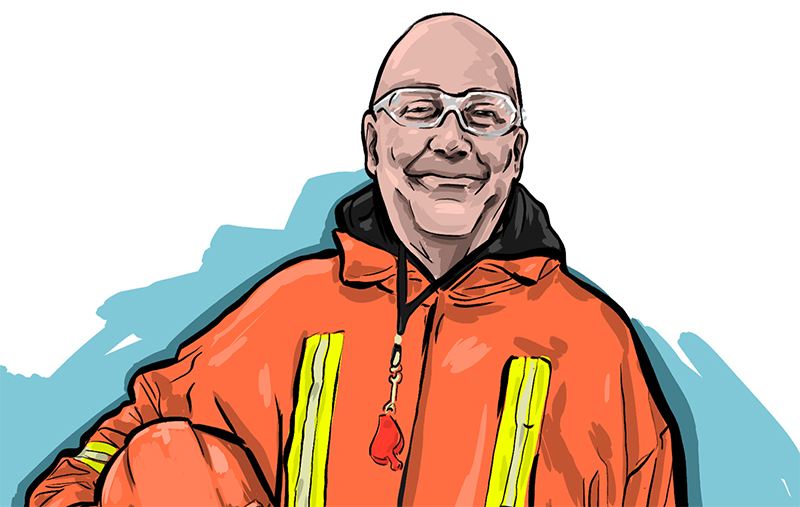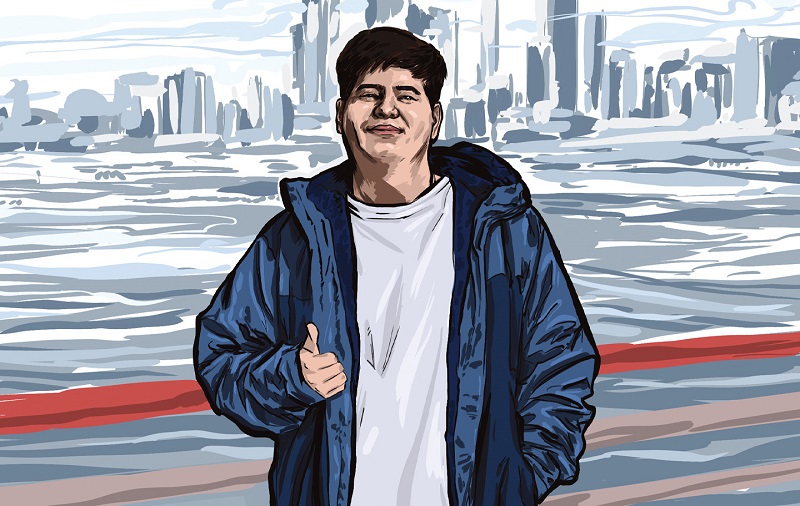Overcoming COVID-19 and Cardiac Arrest: The Miracle Man

January 20, 2021
Typically, we photograph every patient appearing in HealthU. Because this story was planned during the surge of COVID-19, that contact would have been too risky. Instead, our team took a creative approach and replaced photo shoots with illustrated portraits of patients.
Plenty of people have a nickname. But few have one as profound as Mark Renwanz, or the “Miracle Man,” as his doctors call him.
On the morning of May 1, 2020, Mark was at home in Brick, New Jersey, getting ready to drive to Hoboken to visit his daughter and grandchild. He was bringing them bagels, and he wanted to get out early to beat the traffic.
But when the 64-year-old sat down for a moment before hitting the road, his girlfriend, Maria, who happened to be working from home that day, asked him why he was so pale and sweaty. That’s the last thing he remembers before waking up in the hospital 12 days later.
“Maria said my lights were on, but nobody was home, like she was just talking to herself,” says Mark, who’s worked construction in the transportation industry for the last decade. “When I started pointing to my chest, she called 911 right away.”
On the way to Ocean Medical Center, Mark, whose mother died of a heart attack at age 62, flatlined twice. Paramedics had to use a defibrillator to revive him. He was having a heart attack, and every second was critical.
“He came in with a massive heart attack,” says Arthur Okere, M.D., an interventional cardiology specialist at Ocean. “This particular heart attack, given its position in a major vessel, is often referred to as ‘the widow-maker,’ and not everyone survives it.”
After Dr. Okere successfully placed several stents in Mark’s heart, he was moved to a different floor to begin his recovery. But soon after, he suffered cardiac arrest and needed to be shocked by a defibrillator again and placed on a ventilator.
“Sometimes after an initial heart attack, there can be residual effects and abnormal rhythms,” Dr. Okere says. “It’s not entirely uncommon for another cardiac event to occur. It’s sort of like PTSD after getting in a fight.”
But Mark’s fight wasn’t over.
COVID Conundrum
Soon after Mark was placed on the ventilator, he tested positive for COVID-19. While he contracted the virus before coming to the hospital, the virus wasn’t detectable when he received his initial test upon arrival.
Now in the intensive care unit (ICU), Gustavo Delaluz, M.D., a critical care medicine specialist, joined the care team to treat Mark. But it was a fight against time: Mark spiked a fever of 103 degrees, his chest X-rays showed severe lung damage, and he struggled to breathe on the ventilator.
“The outlook was not good,” Dr. Delaluz says. “We knew we didn’t have time to waste.”
Dr. Delaluz treated him with vitamin C, zinc and an antibiotic, along with the anti-viral drug Remdesivir, which was still experimental at the time, and plasma donated by patients who had already recovered from the virus.
For 12 days, Mark lay in the ICU, unconscious, intubated and without his family by his side. Because of the virus, visitors weren’t allowed in the hospital. But Mark wasn’t giving up, and neither were his doctors.
“I never stop fighting until the fighting is done,” Dr. Okere says. “I spoke to his family every day, so I was fighting for them, too. I even studied his labs when I went home. I needed to save this guy.”
Against All Odds
When Mark came off the ventilator on May 12, he was confused and weak, but he was alive. He was negative for COVID-19, and his oxygen levels were good.
“I had no clue where I was, but Dr. Okere and Dr. Delaluz were fantastic,” he says. “I’m a straight shooter, and so were they. They didn’t sugar-coat anything, but they were still comforting.”
Mark spent his last three days in the hospital at Shore Rehabilitation Institute before begging his doctors to let him go home.
Mark beat the odds and survived a heart attack, cardiac arrest and COVID-19. Thus, his doctors named him their “Miracle Man.”
“My doctors couldn’t believe I made it,” Mark says. “But I think it’s because I’ve never missed a day of work, and I’m never sick. Never underestimate a big, tough guy.”
But Mark isn’t as big these days: He’s dropped nearly 50 pounds since he was admitted to the hospital. He still enjoys an occasional glass of red wine, but his diet has improved and he’s feeling good.
“He came to my office not long ago and he looked great,” Dr. Delaluz says. “I told him he kept me up at night for two straight weeks, but it was all worth it. I’ll never forget him.”
Next Steps & Resources
- Meet your sources: Arthur Okere, M.D. and Gustavo Delaluz, M.D.
- To make an appointment with Arthur Okere, M.D., Gustavo Delaluz, M.D. or another provider, call 800-822-8905 or visit our website
The material provided through HealthU is intended to be used as general information only and should not replace the advice of your physician. Always consult your physician for individual care.
Find a doctor near me
What Are Your Chances of Having a Second Heart Attack?

You’ve recently had a heart attack and are fearful about having a second one. Your fear is valid.
How Does COVID-19 Affect the Heart?

COVID-19: Heart effects explained. Dr. Sharma discusses potential long-term cardiac issues and offers guidance. Learn more & get care.
Find a doctor near me
Hall-of-Famer Harry Carson Gets a Shot to Protect
Hall-of-Famer Harry Carson shares his COVID-19 vaccine experience. Learn why he got vaccinated & protect yourself. Get the latest updates.

22-year-old Makes Incredible Recovery from Both COVID-19 and Stroke
22-Year-Old's Remarkable Stroke & COVID-19 Recovery. Learn about stroke care and find a doctor. Call 800-822-8905.

After a Heart Attack in His Thirties, Where is He Now?
Heart attack survivor Simon Blazejowicz shares his recovery journey after treatment at JFK University Medical Center. Learn from his experience and prioritize your heart health. Schedule an appointment today.

After Experiencing an Aortic Aneurysm, Where is He Now?
Aortic aneurysm survivor Thomas Redmond shares his recovery journey and advice. Learn how he maintains his health and find a primary care physician.
